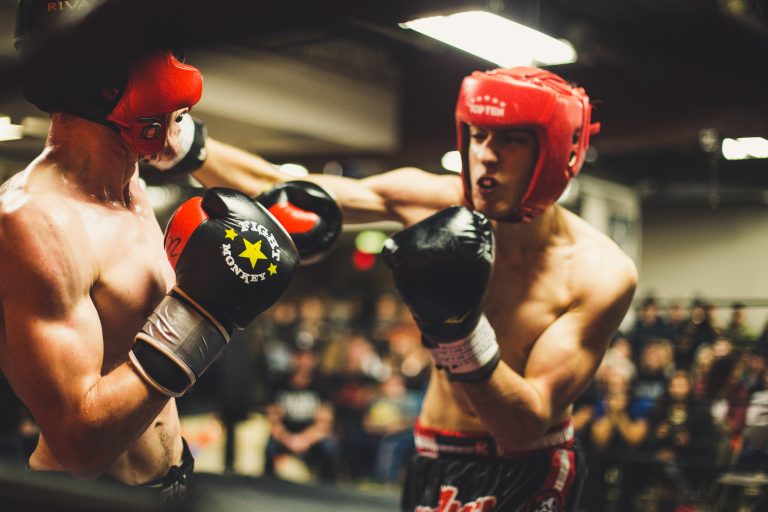Karatetraining – die effiziente Art des Kampf- und Fitnesssports
Karate ist ein Kampfsport, der sowohl als Kampfsport als auch als Fitnesssport betrieben werden kann. Es ist eine alte Kampfkunst, die ihren Ursprung in Japan hat und sich über viele Jahrhunderte entwickelt hat. Karate ist eine sehr effiziente Art der körperlichen Ertüchtigung und eignet sich besonders gut zur Förderung der körperlichen und seelischen Gesundheit.
In diesem Blogbeitrag möchte ich einen Einblick in die Grundlagen des Karatetrainings geben und einige Tipps für Anfänger geben. Wir werden uns ansehen, welche Grundlagen es für das Karatetraining gibt und wie man am besten anfängt.
Grundlagen des Karatetrainings
Die Grundlagen des Karatetrainings sind recht einfach. Es ist wichtig, dass man die richtige Technik beherrscht und lernt, sich richtig zu bewegen. Dazu gehören die Kata (Formen), die einzelnen Bewegungen und die Techniken, wie man sich gegen Angriffe schützt. Letztendlich muss man aber auch die richtige Einstellung haben, um mit seinem Training erfolgreich zu sein.
Kata
Kata sind festgelegte Bewegungsabfolgen, die traditionell in der Kampfkunst Karate gelehrt werden. Sie dienen dazu, die Grundlagen der Kampftechnik zu vermitteln und zu trainieren. Sie werden in viele verschiedene Stile unterteilt, jeder Stil hat seine eigenen Kata. Kata sind eine wichtige Grundlage für das Karatetraining und helfen, den Körper zu koordinieren und die Techniken zu üben.
Techniken und Bewegungen
Neben den Kata gibt es noch weitere Techniken und Bewegungen, die man im Karatetraining erlernen kann. Dazu gehören verschiedene Blocks, Schläge, Tritte und Griffe. Diese Techniken helfen, Angriffe abzuwehren oder selbst anzugreifen. Es ist wichtig, dass man diese Techniken richtig beherrscht, um im Kampf erfolgreich zu sein.
Kampfstrategie
Neben den Techniken ist es auch wichtig, eine gute Kampfstrategie zu haben. Dies beinhaltet die richtige Einstellung zum Kampf, die richtige mentale Vorbereitung und die richtige Taktik. Durch eine gute Kampfstrategie kann man sich im Kampf besser behaupten und seinen Gegner überwältigen.
Tipps für Anfänger
Für Anfänger ist es nicht leicht, mit dem Karatetraining anzufangen. Hier sind einige Tipps, die Ihnen helfen können:
- Finden Sie einen guten Lehrer: Es ist wichtig, dass Sie einen guten Lehrer finden, der Ihnen die Grundlagen des Karatetrainings beibringen kann.
- Erstellen Sie einen Trainingsplan: Erstellen Sie einen Trainingsplan, der Ihnen hilft, Ihr Training effektiv zu gestalten.
- Steigern Sie Ihre Kraft und Ausdauer: Um im Karate erfolgreich zu sein, müssen Sie Ihre Kraft und Ausdauer trainieren. Gehen Sie regelmäßig ins Fitnessstudio oder machen Sie Cardiotraining.
- Finden Sie einen Übungspartner: Es ist hilfreich, einen Übungspartner zu haben, mit dem Sie Techniken üben können.
- Halten Sie sich motiviert: Es ist wichtig, dass Sie sich motiviert halten und regelmäßig trainieren.
Fazit
Karate ist eine alte Kampfkunst, die sowohl als Kampfsport als auch als Fitnesssport betrieben werden kann. Es ist eine sehr effiziente Art der körperlichen Ertüchtigung und eignet sich besonders gut zur Förderung der körperlichen und seelischen Gesundheit. Um erfolgreich mit dem Karatetraining anzufangen, sollten Anfänger Grundlagen wie Kata, Techniken und Bewegungen erlernen und eine gute Kampfstrategie entwickeln. Um motiviert zu bleiben, sollten Anfänger versuchen, einen guten Lehrer zu finden, einen Trainingsplan zu erstellen und regelmäßig Kraft- und Ausdauerübungen zu machen.
Frequently Asked Questions About Karate Training – The Efficient Way of Combat and Fitness Sports
Karate training is a widely popular martial art that is not just about fighting or self-defense, but also about physical fitness, building discipline, gaining confidence, and improving mental health. If you are new to karate or have been practicing for some time, you may have a lot of questions about this traditional discipline. So, let’s take a look at some of the most frequently asked questions that may pop up in your mind:
1. What is Karate?
Karate is a martial art that originated in Okinawa, Japan, and has since spread to different parts of the world. The word ‚karate‘ means ‚empty hand‘ in Japanese. It is based on the principles of blocking, striking, and kicking techniques that are used for self-defense and combat. Karate is a combination of physical and mental discipline that encompasses different styles, forms, and techniques that vary depending on the school or the instructor.
2. What are the Benefits of Karate Training?
Karate training has many benefits both for a person’s physical and mental health. It helps to:
– Improve flexibility, strength, and overall fitness
– Develop coordination, balance, and agility
– Boost confidence and self-esteem
– Build discipline and self-control
– Increase focus and concentration
– Reduce stress and anxiety
– Enhance social skills and teamwork
– Develop respect for oneself and others
3. Do I Need to Be in Good Shape to Practice Karate?
Karate is suitable for people of all ages and fitness levels. You don’t have to be in excellent shape to start practicing karate. In fact, karate training is an effective way to improve your physical fitness gradually. As you progress, you will notice an improvement in your strength, endurance, and flexibility.
4. Is Karate Training Safe?
Like any other physical activity or sport, karate training does come with some risks. However, with proper training, instruction, and safety measures, the chances of injury are significantly reduced. Karate training emphasizes safety, and instructors always make sure that students follow the proper techniques and precautions to prevent accidents.
5. What Should I Expect in A Karate Training Class?
In a typical karate training class, you will start with a warm-up session that involves stretching, cardio, and bodyweight exercises. The instructor will then demonstrate and explain different techniques such as strikes, kicks, blocks, and stances. Then, you will practice these techniques against a partner or a padded dummy. Finally, you will finish the class with a cool-down session that includes stretching and breathing exercises.
6. How Long Does it Take to Learn Karate?
Learning karate is a lifelong journey, and the time it takes to become proficient depends on different factors such as how often you train, your natural abilities, and your dedication. Typically, it takes around three to five years to obtain a black belt in karate. However, this can vary depending on the school or the instructor.
7. Can Kids Practice Karate?
Yes, karate is an excellent martial art for children. It helps to develop motor skills, coordination, focus, and self-confidence. Karate instructors usually tailor their classes to suit the different age groups and skill levels of the students.
8. Are There Competitions in Karate?
Yes, karate is a competitive sport, and there are different tournaments and competitions held locally, nationally, and internationally. Karate competitions usually involve demonstrations of forms, sparring, and breaking techniques.
9. What Equipment Do I Need for Karate Training?
For karate training, you will need comfortable athletic clothing, such as a gi (karate uniform) that consists of a jacket and pants. You will also need a belt to indicate your rank or level. Other essential equipment includes protective gear such as gloves, shin guards, and headgear.
10. Can Karate Help Me in Self-Defense?
Yes, karate training can help you develop the necessary skills and techniques to defend yourself in dangerous situations. Karate techniques focus on blocking, striking, and kicking, which can help to subdue an attacker or create a window to escape from a threatening situation.
Conclusion
Karate training is an effective and efficient way to maintain a healthy and active lifestyle while also learning valuable self-defense skills. By answering some of the frequently asked questions, we hope that we have provided a better understanding of this martial art discipline. Whether you are a beginner or an advanced practitioner, karate training can help you develop physical, mental, and social skills that can benefit your daily life.
Inhaltsverzeichnis






